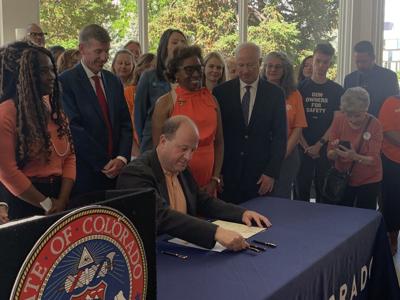A federal judge on Thursday rejected a request from gun rights advocates to block a recent Colorado law prohibiting the possession and transport of certain firearm components not imprinted with a serial number — known as "ghost guns."
To address the proliferation of guns privately assembled from kits or 3-D printers, the General Assembly enacted Senate Bill 279 last year, making it a misdemeanor to possess ghost guns unless the owner obtains a serial number from a licensed firearm dealer and the dealer performs a background check. Multiple violations of the law are felony offenses.
On Jan. 1, the National Association for Gun Rights and Rocky Mountain Gun Owners sued to strike down the law under the Second Amendment. Under the recent guidance from the U.S. Supreme Court's conservative majority, they argued the ghost gun ban could not survive constitutional scrutiny.
In a May 2 order, U.S. District Court Judge Gordon P. Gallagher declined to issue a preliminary injunction, finding the plaintiffs did not have standing to challenge certain aspects of the law. Otherwise, he did not believe SB 279 even implicated the plaintiffs' Second Amendment right to keep and bear arms.
The law "imposes a condition on the commercial sale of a firearm," Gallagher observed. It "does not prevent an individual from buying an unfinished frame or receiver or firearms part kit and in no way infringes upon Plaintiffs’ right to acquire arms. Rather, the Statute requires the purchaser to have the frame or receiver serialized."
Sen. Rhonda Fields, D-Aurora, who was one of SB 279's sponsors, welcomed the decision.
"No one should be able to produce an unregulated, unserialized gun in their home and basement. Our law says you go to a dealer, get a gun, with a background check, it's serialized," she said. "To undermine our process and federal standards gives license to people who want to do harm and do criminal activity with an unregistered gun. We aren't going to tolerate that."
The plaintiff groups have regularly sought to strike down gun safety laws following the Supreme Court's 2022 decision in New York State Rifle & Pistol Association, Inc. v. Bruen. By 6-3, the court laid down a new legal framework for analyzing the constitutionality of gun regulations broadly, scrapping the government's ability to illustrate how a limitation on Second Amendment rights would advance a compelling public safety goal.
Instead, Bruen requires the government to show a restriction is "consistent with this Nation’s historical tradition of firearm regulation."
"The tradition of at-home gun-making predates this nation’s founding, extends through the revolution, and reaches modern times," the plaintiffs wrote in their motion for a preliminary injunction. The government, in turn, disputed that private firearm assembly was common in the 18th century.
Gallagher, an appointee of President Joe Biden, found he did not need to answer whether history and tradition supported the ghost gun ban. In concluding the prohibition did not trigger the Second Amendment, he quoted from the conservative justices who wrote in the Bruen case.
"Our holding decides nothing about who may lawfully possess a firearm or the requirements that must be met to buy a gun. Nor does it decide anything about the kinds of weapons that people may possess," wrote Justice Samuel A. Alito Jr.
"Despite the evolution of the Supreme Court’s Second Amendment jurisprudence," Gallagher noted, "the Supreme Court (either in majority holdings or by the individual justices) has consistently reaffirmed that there are constitutional limitations to the Second Amendment."
Gallagher further narrowed the ability of the plaintiffs to challenge certain aspects of the law, based on what he heard during a March hearing. Three members of Rocky Mountain Gun Owners who are also named plaintiffs — Christopher James Hiestand Richardson, Max Edwin Schlosser and John Mark Howard — did not indicate they had the capability of 3-D printing firearm components, meaning that aspect of the law inflicted no injury to them.
Moreover, Gallagher observed a recent federal rule from the Bureau of Alcohol, Tobacco, Firearms and Explosives similarly requires the inclusion of serial numbers on gun parts to facilitate the tracing of firearms used in crimes. That requirement would remain in place even if Colorado's law were to be blocked.
At the same time, Gallagher noted the Supreme Court agreed last week to review whether the ATF has the authority to regulate gun components as "firearms" in a challenge that originated from Texas.
"It is conceivable that, during the next term, the Supreme Court could determine that the ATF exceeded its congressionally delegated authority," Gallagher acknowledged. "As of now, however, the governing federal law renders this claim too speculative."
The attorney for the plaintiffs did not immediately respond to an email seeking comment.
The case is National Association for Gun Rights et al. v. Polis.
Colorado Politics reporter Marianne Goodland contributed to this article.






 Your Privacy Choices
Your Privacy Choices